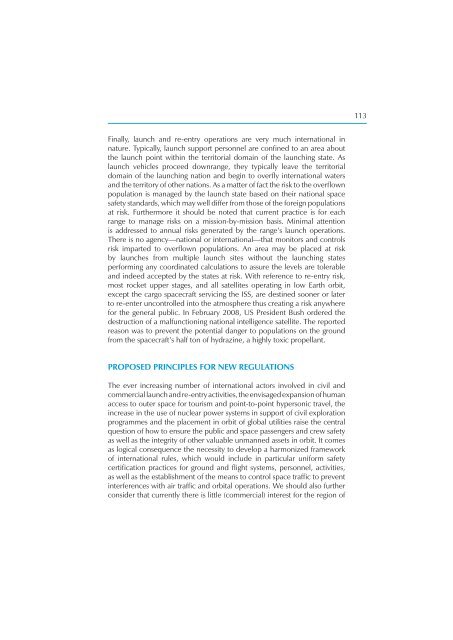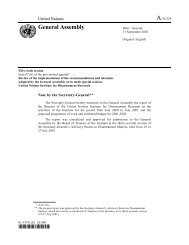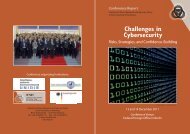Security in Space The Next Generation - UNIDIR
Security in Space The Next Generation - UNIDIR
Security in Space The Next Generation - UNIDIR
Create successful ePaper yourself
Turn your PDF publications into a flip-book with our unique Google optimized e-Paper software.
F<strong>in</strong>ally, launch and re-entry operations are very much <strong>in</strong>ternational <strong>in</strong><br />
nature. Typically, launch support personnel are confi ned to an area about<br />
the launch po<strong>in</strong>t with<strong>in</strong> the territorial doma<strong>in</strong> of the launch<strong>in</strong>g state. As<br />
launch vehicles proceed downrange, they typically leave the territorial<br />
doma<strong>in</strong> of the launch<strong>in</strong>g nation and beg<strong>in</strong> to overfl y <strong>in</strong>ternational waters<br />
and the territory of other nations. As a matter of fact the risk to the overfl own<br />
population is managed by the launch state based on their national space<br />
safety standards, which may well differ from those of the foreign populations<br />
at risk. Furthermore it should be noted that current practice is for each<br />
range to manage risks on a mission-by-mission basis. M<strong>in</strong>imal attention<br />
is addressed to annual risks generated by the range’s launch operations.<br />
<strong>The</strong>re is no agency—national or <strong>in</strong>ternational—that monitors and controls<br />
risk imparted to overfl own populations. An area may be placed at risk<br />
by launches from multiple launch sites without the launch<strong>in</strong>g states<br />
perform<strong>in</strong>g any coord<strong>in</strong>ated calculations to assure the levels are tolerable<br />
and <strong>in</strong>deed accepted by the states at risk. With reference to re-entry risk,<br />
most rocket upper stages, and all satellites operat<strong>in</strong>g <strong>in</strong> low Earth orbit,<br />
except the cargo spacecraft servic<strong>in</strong>g the ISS, are dest<strong>in</strong>ed sooner or later<br />
to re-enter uncontrolled <strong>in</strong>to the atmosphere thus creat<strong>in</strong>g a risk anywhere<br />
for the general public. In February 2008, US President Bush ordered the<br />
destruction of a malfunction<strong>in</strong>g national <strong>in</strong>telligence satellite. <strong>The</strong> reported<br />
reason was to prevent the potential danger to populations on the ground<br />
from the spacecraft’s half ton of hydraz<strong>in</strong>e, a highly toxic propellant.<br />
PROPOSED PRINCIPLES FOR NEW REGULATIONS<br />
<strong>The</strong> ever <strong>in</strong>creas<strong>in</strong>g number of <strong>in</strong>ternational actors <strong>in</strong>volved <strong>in</strong> civil and<br />
commercial launch and re-entry activities, the envisaged expansion of human<br />
access to outer space for tourism and po<strong>in</strong>t-to-po<strong>in</strong>t hypersonic travel, the<br />
<strong>in</strong>crease <strong>in</strong> the use of nuclear power systems <strong>in</strong> support of civil exploration<br />
programmes and the placement <strong>in</strong> orbit of global utilities raise the central<br />
question of how to ensure the public and space passengers and crew safety<br />
as well as the <strong>in</strong>tegrity of other valuable unmanned assets <strong>in</strong> orbit. It comes<br />
as logical consequence the necessity to develop a harmonized framework<br />
of <strong>in</strong>ternational rules, which would <strong>in</strong>clude <strong>in</strong> particular uniform safety<br />
certifi cation practices for ground and fl ight systems, personnel, activities,<br />
as well as the establishment of the means to control space traffi c to prevent<br />
<strong>in</strong>terferences with air traffi c and orbital operations. We should also further<br />
consider that currently there is little (commercial) <strong>in</strong>terest for the region of<br />
113








